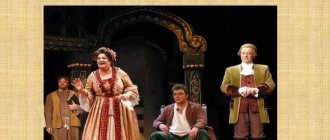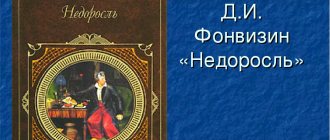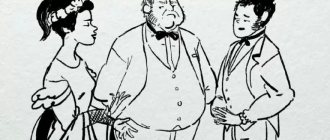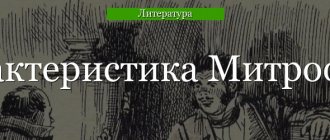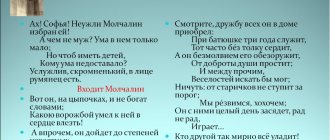Fonvizin’s work touches on topical issues of his contemporary society, among which we can highlight the problem of social relations, issues of upbringing and education of the younger generation. As a contrast to ignoramuses and loafers, there is a bright, collective image of a young girl, endowed with the best qualities of a real Russian woman. We are talking about one of the main heroines of the novel, around whom a whirlpool of passions connected with her dowry revolves. The image and characterization of Sophia in the comedy “The Minor” gives the reader a complete idea of what girls were like in the Age of Enlightenment. She is a positive character in the work and serves as a worthy example to follow.
The name of the heroine fully corresponds to her appearance and character. Translated from Greek, Sophia means “wise”, “reasonable”.
Origin of the heroine
Sophia is from a noble family, she has an uncle whose name is Starodum:
...Her uncle, Mr. Starodum, went to Siberia...
She has no parents, she became an orphan, since her father died when she was a baby, and her mother died six months before the events described in the work. However, Sophia was partly lucky: she was not left without housing; her mother and father left her an estate.
After her mother passed away, the girl had to live with her relatives, the Prostakovs, since she could not live with her uncle yet: at that time he was doing military service in Siberia.
Life in the new family was not sweet. The Prostakovs kept her in their house and used her income, which came from the estate in the village. Relatives wanted her to become the wife of Skotinin, the brother of the stupid and cruel Prostakova, but this did not happen, since Prostakova found out that the girl had an inheritance. Then they wanted to marry her to Mitrofan, their stupid son, who did not want to study and achieve anything in life.
The heroine is the complete opposite of Mitrofan and they have nothing in common: he is spoiled in every possible way by his parents, and she is an unfortunate orphan. He is stupid, and she constantly reads books to develop spiritually and morally. She wants to study and cares about her future, has her own opinion and is a mature personality, while Mitrofan cannot decide anything without his mother.
Again, everything did not go according to the relatives’ plan, as Starodum arrived. Then Prostakova orders the girl to be kidnapped. Fortunately, everything ends well for Sophia.
Plot: summary of the play “Minor”
The plot of “The Minor” is well known to everyone since school years, but we will still recall a brief summary of the play in order to restore the sequence of events in our memory.
The action takes place in the village of Prostakovs. Its owners - Mrs. and Mr. Prostakov and their son Mitrofanushka - live the quiet life of provincial nobles. Also living on the estate is the orphan Sofyushka, whom the lady sheltered in her house, but, as it turns out, not out of compassion, but because of the inheritance, which she freely disposes of as a self-proclaimed guardian. In the near future, they plan to marry Sophia to Prostakova’s brother Taras Skotinin.
The mistress's plans collapse when Sophia receives a letter from her uncle Starodum, who was still considered dead. Stradum is alive and well and is going on a date with his niece, and he also reports a fortune of 10 thousand in income, which he passes on as an inheritance to his beloved relative. After such news, Prostakova begins to court Sophia, whom she has hitherto given little favor to, because now she wants to marry her to her beloved Mitrofan, and leave Skotinin with nothing.
Fortunately, Starodum turned out to be a noble and honest man who wished well for his niece. Moreover, Sophia already had a betrothed - officer Milon, who had just stopped with his regiment in the village of Prostakov. Starodub knew Milo and gave the young man his blessing.
In desperation, Prostakova tries to organize the kidnapping of Sophia and forcibly marry her to her son. However, even here the treacherous mistress suffers a fiasco - Milon saves his beloved on the night of the kidnapping.
Prostakova is generously forgiven and not put on trial, although her estate, which has long been a source of suspicion, is transferred to a state guardian. Everyone leaves and even Mitrofanushka leaves his mother, because he doesn’t love her, like, in general, no one else in the world.
Girl character
In the image of Sophia in the comedy “The Minor,” Fonvizin showed what a real woman should be like in Russia during the Enlightenment. Sophia's characterization shows that the girl has a wonderful character with many advantages. Like other heroes, she has a “speaking” name, since its meaning (wise, wise, reasonable) fully reflects her character. In the comedy “The Minor,” the author describes this girl exactly this way. She is very gentle, kind and sensitive. She is also well educated and reads a lot of French books.
Main features of the heroine:
- meekness;
- modesty;
- patience;
- kindness;
- mind;
- education;
- the desire for true moral guidelines.
Her patience is surprising: she steadfastly endures everything that the Prostakovs do to her:
...How many sorrows have I endured since the day of our separation! My unscrupulous relatives...
Essay 2
The comedy “The Minor” belongs to classicism, therefore all the images of the characters were created within the framework of this direction. According to the laws of classicism, the names of all characters speak about the author’s attitude towards them and briefly characterize them. "Sophia" translated into Russian means wisdom. Indeed, in the comedy, Sophia is an example of female beauty and intelligence.
Sophia is an orphan. The girl has no close relatives. Her parents are dead. The only relative for her is Starodum. She lives with her distant relatives - the Prostakovs. The girl is very different from the background. Sophia reads French books, so she is smart. The girl is very patient. She knows how to come to terms with her fate, so she endures insults from the Prostakovs. Outwardly, she is very attractive, but, as expected in classicism, the author pays more attention to her inner world than to her outer world, which, according to his canons, is only a reflection of her moral perfection. She is brave, strong.
Sophia is very sensitive, so she knows how to love strongly and truly. The girl falls in love with officer Milo. Sophia does not divulge her secret and remains silent. This is very wise of her. But the Prostakovs are not at all interested in her feelings. They only care about her wealth, because Sophia is a rich heiress, she has many villages that she inherited from her parents. Because of her wealth, Sophia became an object of profit in her adoptive family. The girl understands this; it is difficult for her to survive such an event. They already appropriate the girl’s income from the estates.
Skotinin wanted to become Sophia's husband because of the piglets that live in one of her villages. But later Mitrofan expressed his desire to marry Sophia. This undoubtedly changed the state of affairs, because for Mrs. Prostakova, her son’s happiness was more valuable than her brother’s happiness.
Honest Sophia has a hard time in such an environment. She is looking forward to the return of her uncle, whom she loves and appreciates very much. The girl misses his kindness and love, which she so lacks surrounded by evil, dishonor and self-interest.
Soon her uncle arrives, who helps her niece get out of this vicious circle and marry Milo, whom she loves so much. Wise Sophia wrote to her uncle about her feelings, hiding them from others.
Sophia is the ideal of female beauty and education in the comedy “Minor.” It wasn’t easy for the girl, but she was able to cope with life’s adversities.
Sofia and Prostakova
In the play, these two heroines are opposed to each other. According to the author's description, Mrs. Prostakova is very angry and rude towards all the people around her. She doesn't value her marriage and doesn't love or respect her husband. For a girl, on the contrary, her marriage is desirable, she does not want to become someone’s wife without love. She loves Milon and dreams of seeing him as her fiancé. Sophia respects and appreciates him as a man; for her, marriage is a very important step in life.
Prostakova believes that a woman:
- No education or reading required.
- You can only deal with housework, routine, everyday life, and raising children.
Sophia, on the contrary, strives for knowledge, wants to understand high things, reads a lot, which can characterize her as a smart girl.
Popular writings
- Essay on the topic Loyalty to the Motherland
Every person has his own Motherland. Homeland is the place where you were born and raised. This is my only native land. Is it very important to love your Motherland and remain faithful to your Motherland? - Essay on the topic My friendly family
Family is something without which a person cannot fully exist. Relatives will always provide support and help in moments of sadness and despair. And today I want to talk about my friendly family. - The role of knowledge in human life essay
With the creation of the world, man appears. From birth, a person begins to struggle. He goes through many trials to build himself as a person. Over the course of many years, he acquires wisdom and becomes an intelligent being.
Moral ideals
The girl appreciates it when people treat her well. Only her uncle treated her with kindness and affection, and she is very happy that he is in her life. Despite the fact that it was not easy for her, she was well brought up: she treats those older and more authoritative with respect and respect.
Those who raised Sophia paid special attention to morality, explaining that the main thing was family values, love for parents, justice and honesty, kindness towards those of lower status or poor. The author, using the examples of Sophia and Mitrofan, shows which upbringing is correct and which is not.
Fonvizin also shows that a child can adopt negative traits from his parents, as happened in the Prostakov family. The mother, moreover, suppressed her son as a person, because she loved to frighten him and order him what to do. Mitrofan has no opinion; he cannot resist his mother’s words and actions.
At the end of the work, the girl manages to stay with the one she loves and who loves her, this is officer Milon:
...young man Milon. He is in love with Sophia, and Sophia is in love with him: these faces... - honest, noble, educated...
Both before and now, girls like Sophia remain role models. This image, often used in essays and cinquains, shows readers what it is like to be an honest, kind, open and sympathetic person, even when fate gives difficulties along the path of life.
Characteristics of heroes: positive and negative characters
As in any classic work, the characters in “The Minor” are clearly divided into positive and negative.
Negative heroes:
- Mrs. Prostakova is the mistress of the village;
- Mr. Prostakov is her husband;
- Mitrofanushka is the son of the Prostakovs, an undergrowth;
- Taras Skotinin is the brother of the Prostakovs.
Positive heroes:
- Sophia is an orphan, lives with the Prostakovs;
- Starodum is her uncle;
- Milon is an officer, Sophia’s lover;
- Pravdin is a government official who came to monitor affairs in the Prostakov village.
Minor characters:
- Tsyfirkin – arithmetic teacher;
- Kuteikin – teacher, former seminarian;
- Vralman is a former coachman, posing as a teacher;
- Eremevna is Mitrofan’s nanny.
Mrs. Prostakova
Prostakova is the most striking negative character, and indeed the most outstanding character in the play. She is the mistress of the Prostakov village and it is the mistress, who has completely suppressed her weak-willed husband, who establishes the lordly order and makes decisions.
At the same time, she is absolutely ignorant, has no manners, and is often rude. Prostakova, like other members of the family, cannot read and despises science. Mitrofanushka’s mother is involved in education only because this is how it is supposed to be in New World society, but she does not understand the true value of knowledge.
In addition to ignorance, Prostakova is distinguished by cruelty, deceit, hypocrisy, and envy.
The only creature she loves is her son Mitrofanushka. However, the mother’s blind, absurd love only spoils the child, turning him into a copy of himself in a man’s dress.
Mr. Prostakov
The figurative owner of the Prostakov estate. In fact, everything is controlled by his domineering wife, of whom he is terribly afraid and does not dare say a word. Prostakov has long lost his own opinion and dignity. He cannot even say whether the caftan sewn by the tailor Trishka for Mitrofan is good or bad, because he is afraid to say something that is not what his mistress expects.
Mitrofan
Son of the Prostakovs, an undergrowth. His family lovingly calls him Mitrofanushka. Meanwhile, it’s time for this young man to enter adulthood, but he has absolutely no idea about it. Mitrofan is spoiled by his mother's love, he is capricious, cruel to servants and teachers, pompous, and lazy. Despite many years of lessons with teachers, the young master is hopelessly stupid, he does not show the slightest desire for learning and knowledge.
And the worst thing is that Mitrofanushka is a terrible egoist; nothing matters to him except his own interests. At the end of the play, he easily leaves his mother, who loved him so unrequitedly. Even she is nothing to him.
Skotinin
Brother of Mrs. Prostakova. Narcissistic, narrow-minded, ignorant, cruel and greedy. Taras Skotinin has a great passion for pigs; the rest is of little interest to this narrow-minded person. He has no idea of family ties, heartfelt affection and love. Describing how well his future wife will heal, Skotinin only says that he will give her the best light. In his system of coordinates, this is precisely what marital happiness consists of.
Sophia
Positive female image of the work. A very well-mannered, kind, meek and compassionate girl. Sophia received a good education, she has an inquisitive mind and a thirst for knowledge. Even in the poisonous atmosphere of the Prostakovs’ house, the girl does not become like the owners, but continues to lead the lifestyle that she likes - she reads a lot, thinks, is friendly and polite to everyone.
Starodum
Sophia's uncle and guardian. Starodum is the voice of the author in the play. His speeches are very aphoristic, he talks a lot about life, virtues, intelligence, law, government, modern society, marriage, love and other pressing issues. Starodum is incredibly wise and noble. Despite the fact that he clearly has a negative attitude towards Prostakova and others like her, Starodum does not allow himself to stoop to rudeness and outright criticism, and as for light sarcasm, his narrow-minded “relatives” cannot recognize it.
Milo
Officer, Sophia's lover. The image of a hero-protector, an ideal young man, a husband. He is very fair and does not tolerate meanness and lies. Milo was brave, not only in battle, but also in his speeches. He is devoid of vanity and low-minded prudence. All of Sophia’s “suitors” talked only about her condition, but Milon never mentioned that his betrothed was rich. He sincerely loved Sophia even before she had an inheritance, and therefore in his choice the young man was not guided by the size of the bride’s annual income.
“I don’t want to study, but I want to get married”: the problem of education in the story
The key problem of the work is the theme of provincial noble upbringing and education. The main character Mitrofanushka receives an education only because it is fashionable and “just the way it is.” In fact, neither he nor his ignorant mother understands the true purpose of knowledge. They should make a person smarter, better, serve him throughout his life and benefit society. Knowledge is gained through hard work and can never be forced into someone's head.
Mitrofan's home education is a dummy, a fiction, a provincial theater. For several years, the unfortunate student did not master either reading or writing. Mitrofan fails the comic test that Pravdin arranges with a bang, but because of his stupidity he cannot even understand this. He calls the word door an adjective, because it is supposedly attached to the opening, he confuses science history with the stories that Vralman tells him in abundance, and Mitrofanushka can’t even pronounce the word “geography”... it’s too tricky.
To show the grotesqueness of Mitrofan’s education, Fonvizin introduces the image of Vralman, who teaches “French and all sciences.” In fact, Vralman (that’s a telling name!) is not a teacher at all, but Starodum’s former coachman. He easily deceives the ignorant Prostakova and even becomes her favorite, because he professes his own teaching methodology - not to force the student to do anything through force. With such zeal as Mitrofan’s, the teacher and student are simply idle.
Education goes hand in hand with acquiring knowledge and skills. Mrs. Prostakova is mostly responsible for him. She methodically imposes her rotten morality on Mitrofan, who (here he is diligent here!) perfectly absorbs his mother’s advice. So, while solving a division problem, Prostakova advises her son not to share with anyone, but to take everything for himself. When talking about marriage, mother speaks only about the bride’s wealth, never mentioning spiritual affection and love. The young Mitrofan is not familiar with such concepts as courage, boldness, and valor. Despite the fact that he is no longer a baby, he is still looked after in everything. The boy cannot even stand up for himself during a clash with his uncle; he immediately begins to call his mother, and the old nanny Eremeevna rushes at the offender with her fists.
The meaning of the name: two sides of the coin
The title of the play has a literal and figurative meaning.
Direct meaning of the name
In the old days, minors were called teenagers, young men who had not yet reached adulthood and had not entered the public service.
The figurative meaning of the name
A fool, an ignoramus, a narrow-minded and uneducated person was also called a minor, regardless of his age. With the light hand of Fonvizin, it was precisely this negative connotation that became attached to the word in the modern Russian language.
Every person is reborn from a minor youth into an adult man. This is growing up, a law of nature. However, not everyone transforms from a dark, half-educated person into an educated, self-sufficient person. This transformation requires effort and perseverance.
Place in literature
: Russian literature of the 18th century → Russian drama of the 18th century → The work of Denis Ivanovich Fonvizin → 1782 → The play “The Minor”.
“The Minor” is a play by D. I. Fonvizin. Analysis of the work, main characters
4.5 (90%) 2 votes
Sophia is the central character of the play, around whom the main events of the play revolve: an unexpected inheritance, the appearance of the girl’s uncle, a kidnapping plan and three suitors fighting each other.
The heroine is well educated, she is left without parents early on and ends up in the house of the Prostakovs, who are trying to take possession of her small inheritance. Knowing that Sophia has a fiancé, Milon, Prostakova is trying to marry her off to her brother Skotinin in order to finally get her hands on the girl’s fortune.
When the landowner finds out that Sophia is a rich heiress, she decides to marry her to Mitrofan. Previously, without ceremony in treating the orphan, Prostakova is now kind and courteous. Realizing that her plans are not destined to come true, the landowner plots the kidnapping of the heroine and forced marriage. However, Starodum, Milon and Pravdin manage to prevent this treachery.
The moral values of the heroine
Sophia in Greek means wisdom. The girl has wisdom of mind and sensitivity of heart. At the end of the play, she forgives Prostakova and rushes to her aid.
Despite the attacks of Prostakova and Skotinin, Sophia remains faithful to her fiancé. At the same time, she is ready to submit to her uncle’s will when he says that he has a suitable party in mind for her. The fact is that she trusts her uncle unlimitedly, asks for his advice and rules to follow.
Sophia talks a lot about life values. For her, conscience and heart are inextricably linked - the peace of one directly depends on the contentment of the other, and for this it is necessary to strictly observe the rules of virtue. She wants to receive respect from those whom she respects, and strives to prevent bad thoughts about herself. Also important to her is the concept of earning your fortune honestly and the belief that being born into a noble family does not make a person noble.
The author's ideal woman
In the image of Sophia, modest and well-mannered, D.I. Fonvizin outlined his feminine ideal. The main principle of family life for her is Starodum’s words and instructions that the head of the family should be a husband who obeys reason, and the wife must obey him in everything. Only then will the family be strong and happy.
Fonvizin strives to make the image of Sofia alive and moving. This is reflected in the heroine’s sophisticated language; she is no stranger to jokes and even manipulation of people - she can easily make her lover jealous.

